#and additionally for the tragedy fan in me! he does everything right and it! doesn't! matter! it doesn't change anything! check!
Explore tagged Tumblr posts
Text
when i started watching the terror i just knew my arctic blorbo was gonna be fitzjames because obviously. and then crozier came in with the one two punch of being a skilled, intelligent, caring captain and being in a waistcoat while he did it
#he really just hits on every aspect of my competence kink yknow#has all the correct plans but no one is fucking listening check#gets to be badass and the hero check#inspires deep loyalty in his subordinates check#cares for them in turn check#and additionally for the tragedy fan in me! he does everything right and it! doesn't! matter! it doesn't change anything! check!#the terror amc#francis crozier
4 notes
·
View notes
Text
I saw this tweet and it gave me a lot of insight on the misunderstandings about what points Technoblade apologists are making (I'm a Technoblade apologist)


There were a lot of counters in the comments, but it really comes down to this: when people say "c!Technoblade was honest about his stance on government" they aren't saying that makes everything he does right, they are saying it makes everyone around him more morally questionable.
There's three events characters and fans cite when discussing c!Technoblade's morality: Killling Tubbo, spawning withers, and spawning withers again.
1) Shooting Tubbo at the festival
C!Tommy considers this the worst action of Technoblade. This isn't because it's hard to justify, it's just because c!Tommy and c!Tubbo are very codependent. In some ways this is the most justifiable violent act of Technoblade. As he puts it, he could not have rescued Tubbo and escaped without at least Tubbo being killed. Someone would kill Tubbo no matter what action he took. The only action that could possibly save Tubbo was Wilbur and Tommy entering the fray, which they did not do. Since Tubbo was doomed to die, it didn't matter (to Technoblade) who killed him. It mattered to morale within the revolution but didn't affect anything else. From Techno's perspective, better he kill Tubbo and live (and keep his gear) than someone else kill Tubbo and Techno get shot at by the crowd.
Additionally, c!Tommy says that this action was Techno obeying the government which was hypocritical (he says this during the destruction of L'Manberg). Feeling forced to kill Tubbo is instead an example of why Technoblade wants to abolish governments. Government leaders can use their power and military might to coerce people. This doesn't indicate Techno has abandoned his principles.
2) Fighting the new government after the revolution
Many see Technoblade fighting against his former revolutionaries as an inciting action or change in stance. I would argue that this action is where the "Technoblade is honest about his goals" argument becomes relevant. Technoblade (a known anarchist) was recruited to destroy a government.
JSchlatt, while corrupt was lawfully elected. In fact, his election was a kind of karmic justice against Wilbur and Tommy who tried to create an election they couldn't lose. JSchlatt was oppressive to his citizens, which is why they turned on him. However, Wilbur and Tommy had no reason to fight JSchlatt beyond wanting the country back that they fairly lost control of. Their fight for L'Manberg was inherently corrupt since they used it to seize the power they lost democratically.
Technoblade did not canonically know that they would immediately reinstate a president. Here's a transcription from around 15minutes into Techno's revolution stream:
Techno: I'll have you know, I'm the most consistent character on this server. All I want is is anarchy. I just want the abolishment of all governments.
Quackity: What if we start winning the war are you gonna switch on us?
Techno: I just want to overthrow the government man I don't see how that's relevant
Quackity and Tubbo: But if we get into power you'd have reason to betray us
Techno: What's this about getting into power?
Basically, c!Technoblade didn't know they would create a government. Since it was Tubbo and Quackity who eom what obliviously revealed that, I'd argue that Wilbur and/or Tommy were deliberately hiding that from Techno in order to get his help. At the festival, he seems shocked that his friends are not only forming a government, but aren't even holding an election. Schlatt was corrupt but Tubbo is set up to be a dictator (they later decide to hold an election but no one knew that yet). There is no fundamental difference between Techno fighting Schlatt or pogtopia. The difference only lies in our sympathy for Wilbur, Tommy, and Tubbo. For c! Technoblade, Schlatt is corrupt and democratically elected, Tommy/Wilbur/Tubbo are his friends but trying to create a dictator ship, and Technoblade started that day wanting to rid the world of a government and wasn't going to let anyone undo that. I would argue that Technoblade spawning those withers can only be considered immoral if the overthrowal of JSchlatt is as well.
3) The destruction of L'Manberg
Tommy makes some contradictory arguments on his speech against Technoblade. He says both that Techno should have left L'Manberg alone as "it doesn't interfere" with him while also saying Technoblade wasn't allowed to retire after his first attack on the government. L'Manberg either had to accept Technoblade's ceasefire or decide to fight him. It's unreasonable to expect Technoblade to sit there while they imprison Phil, hold Carl hostage, and take all three of Techno's lives (because that's the only way the hit list could be successful). L'Manberg can't have peace with Techno by interrupting his resolve to not fight them.
This attack comes down to two things: ideology and revenge. Ideologically, Technoblade is opposed to government. Additionally, since his first attack on them, L'Manberg has proven themselves to be very corrupt. They threatened to kill Carl (an innocent) to get Techno to comply, they imprisoned Phil for not answering their questions (for irl reference, in the US this isn't legal even excluding the no trial aspect), and they executed Technoblade without trial for unspecified crimes. They might have done other corrupt things but I didn't watch most of those streams. All of these corrupt actions can both justify L'Manberg's destruction and explain why Techno wants revenge. As he says, "they made it clear we could not coexist". Quackity told Techno he was on the hit list, indicating that Quackity's goal was Technoblade's permanent death. There was no way Techno wouldn't neutralize that threat who also deserved it in Techno's eyes.
TL:DR The first festival was an unavoidable tragedy and L'Manberg brought the withers attacks upon themselves.
493 notes
·
View notes
Note
I've just read that post on bridges in TASM films, and it reminded me: Before the Spider-verse comic event, Gwen Stacy was essentially the Lost Lenore of Comics. Now Spider-Gwen is popular enough that her fans, and probably younger generations would balk at the idea of Gwen dying. I'm aware that you're a fan of The Night Gwen Stacy Died story, so I hope this doesn't come off as judgmental: It's a major part of the main Spider-Man comics, but does it NEED to be part of general narrative?
This is something I do think about a lot actually because, as you’ve said, it’s pretty well known I’m a fan of The Night Gwen Stacy Died (or a Gwen Stacy deathfucker as some of my friends have delicately and tactfully put it), but I’m also a fan of Gwen, and additionally as a woman who loves big two superhero comics I do think it’s important to consider the treatment of women within that particular media. So I don’t think this question is rude at all, and I think it’s an interesting thing to debate and to talk over. As famous female characters deaths go, Gwen’s is definitely up there, and it is a storyline I personally love and have a lot of feelings about, because, to put it simply, I love a well-done fictional tragedy. I find a lot of the rhetoric around this death to be iffy – Gerry Conway’s own statement that Gwen died because she as a “non-entity”, as compared to the current hyping up of Spider-Gwen as the “Gwen we’ve always needed”, which seems to imply that it was Gwen’s own fault that she died for not being an interesting enough character, or that Gwen is only a valuable or relatable character if she herself has superpowers or is leading a book. There’s a lot to unpack here, no matter what your stance is. I think it’s particularly telling that Gwen’s death is very up there with, say, the deaths of Jason Todd or Bucky Barnes, and yet Gwen, as a female character, does not get a violent “return from the dead” vengeance storyline along the lines of Red Hood or Winter Soldier. Even the recent reframing of Gwen Stacy-65 as Ghost Spider is totally divorced from this subject, despite the fact that the name alone seems to tease the idea of Gwen, back from the dead. The fact that even with Gwen’s resurgence in popularity following The Amazing Spider-Man franchise’s portrayal of her still doesn’t mean she gets a revenge saga the way young and tragically at one time dead male characters do is I think very telling. (I could write the hell out of a Red Hood-esque Gwen Stacy revenge murder miniseries, I am just saying, Marvel.)
But to go back to the question at hand, if I’m being a hundred percent honest, I think that to keep a version of Peter in line with his 616 character development, he needs to suffer a loss of this magnitude at this particular point in his life. Personally, I don’t think that loss needs to be Gwen, but within the adaptation that is being told I think it needs to be of equal weight and importance to what 616 Gwen meant to 616 Peter. Gwen traditionally only ever gets spoken about as his girlfriend, but if you look at the period of comics surrounding her death, it becomes abundantly clear that Peter and Gwen were planning to get married shortly before her death, which adds a certain amount of weight to the relationship that simply referring to her as his girlfriend doesn’t lend:
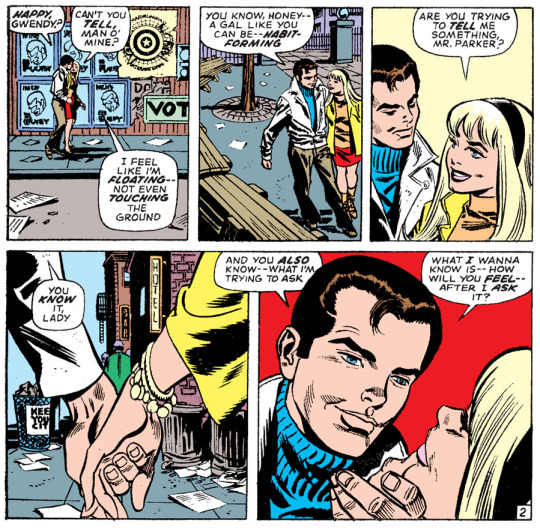
(Amazing Spider-Man #99)
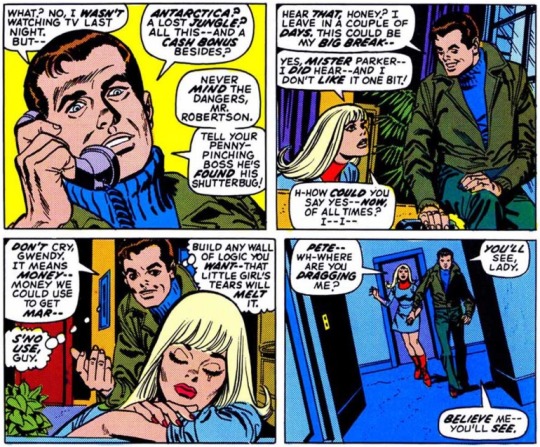
(Amazing Spider-Man #103)
Additionally, for me, I think it’s important that Gwen’s death isn’t just a one and done – she’s dead and it means something, both to Peter and to the rest of the cast that knew her. The definition of fridging is when a woman is killed for a man’s emotional development, true, but I think a key issue is that often when a woman is fridged there isn’t much emotional development when you actually look at the text. The man is sad but then he moves on, and maybe it comes up when he gets into a new relationship with a different woman because he needs to angst about how she can’t end up just like Poor Dead Previous Girlfriend. But I think Gwen’s death has a real weight in the series. She’s not a non-entity; her absence matters. I once saw a post about how Gwen’s death didn’t really have an effect on Peter and I think about it all the time over how incredibly wrong it was:
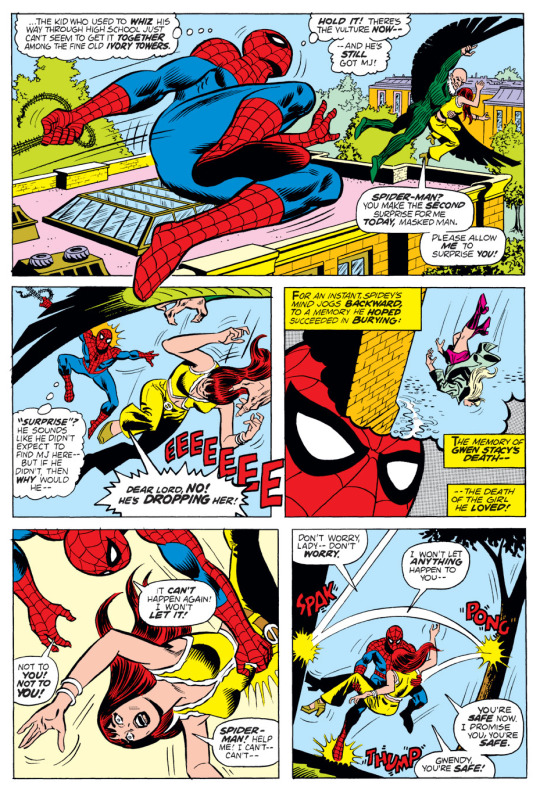
(Amazing Spider-Man #127)
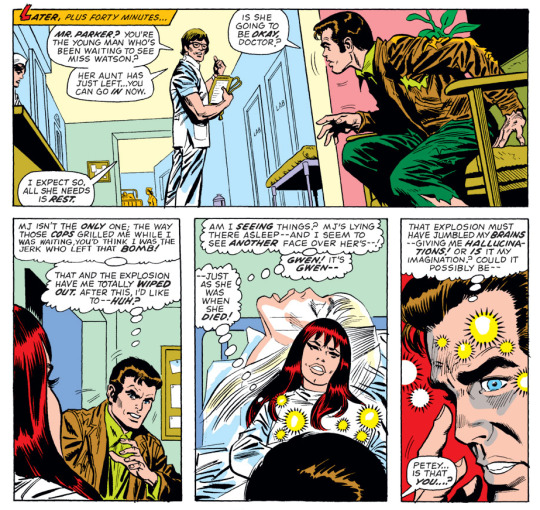
(Amazing Spider-Man #136)
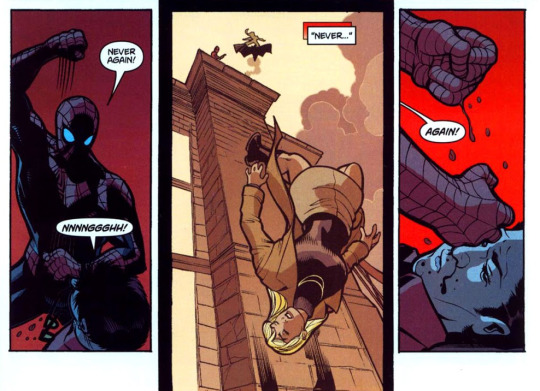
(Spider-Man & Black Cat: Evil That Men Do #6)
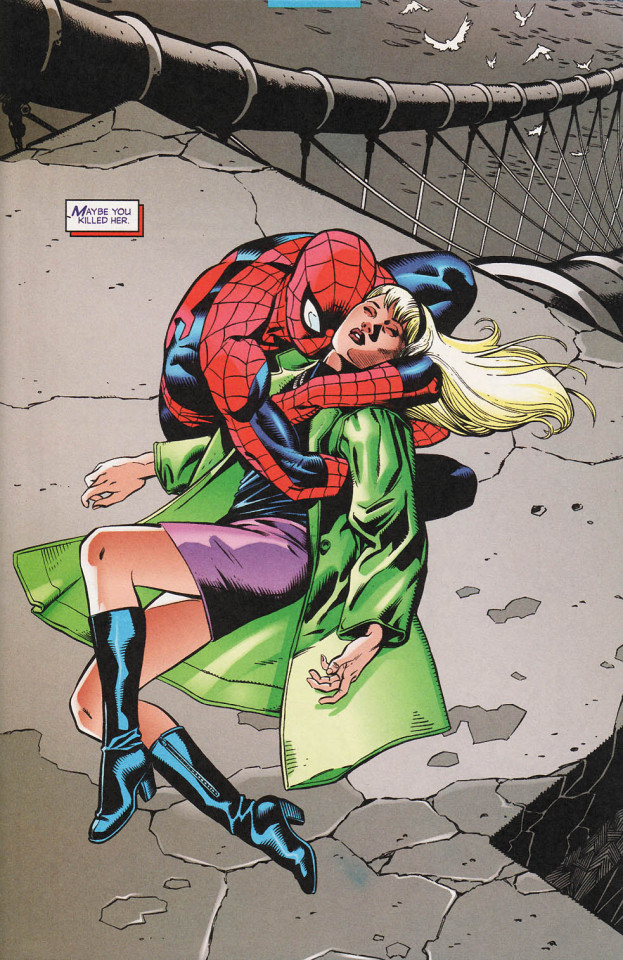
(Webspinners #12)
So this is a loss that deeply and consistently haunts Peter and not one he ever fully recovers from. It’s a loss with very lasting impact, like I said, not just for him, but for other people who knew Gwen.
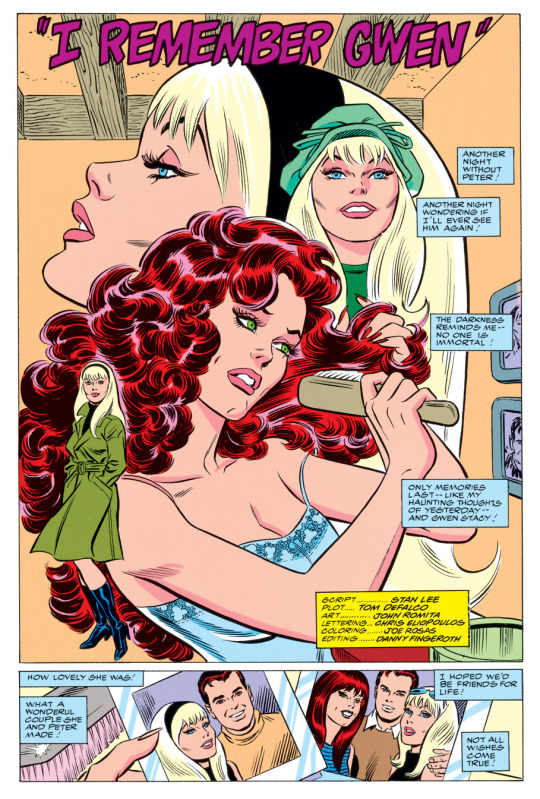
“How lovely she was! What a wonderful couple she and made! I hoped we’d friends for life!” – Amazing Spider-Man #365
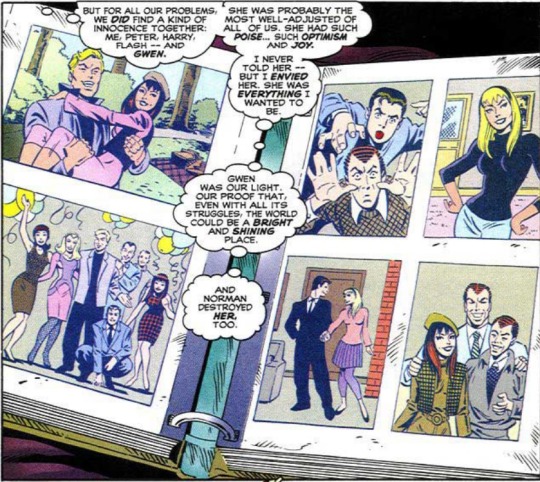
“Gwen was our light.” – Spectacular Spider-Man #250.
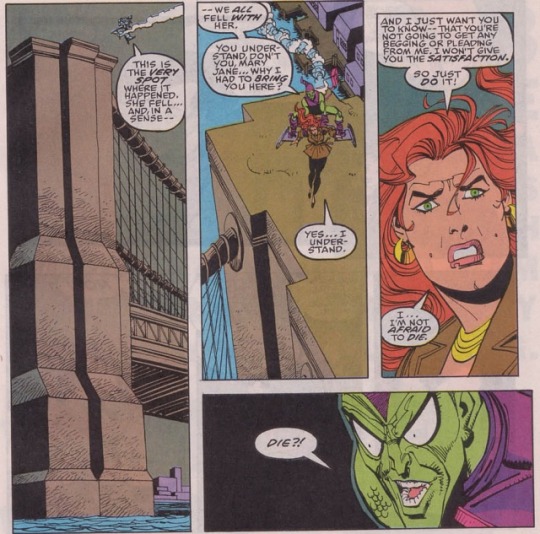
“She fell… and, in a sense – we all fell with her.” – Spectacular Spider-Man #200.
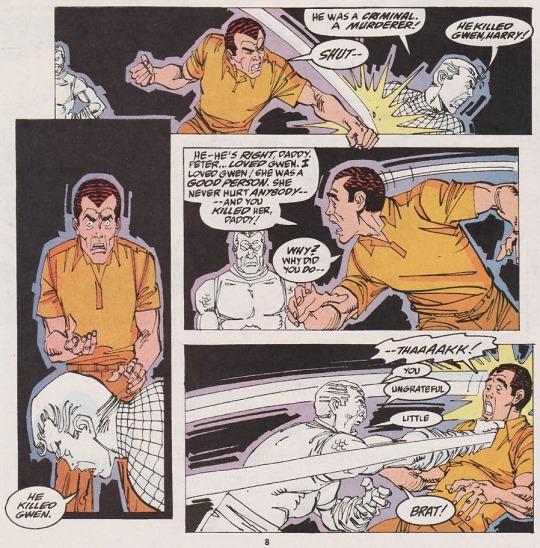
“Peter… loved Gwen. I loved Gwen! She was a good person.” – Spectacular Spider-Man #180
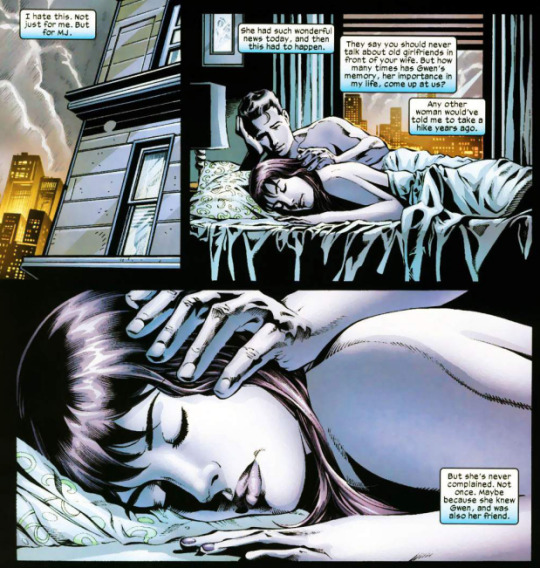
“Maybe because she knew Gwen, and was also friend.” – Amazing Spider-Man #509
Roughly speaking, I would say that to keep Peter on track with his 616 character development, the loss needs to be of a person in a serious and committed romantic relationship with Peter. The circumstances need to be duplicated, in my opinion, to track with 616 Peter’s development, but Gwen doesn’t necessarily have to be the character that dies. I personally have several WIP AUs where I’ve subbed out Gwen in this role for Harry; combined with Harry’s drug addiction and Peter’s natural protectiveness, as well as Norman’s role in this particular murder, it makes for a very interesting version of events. This sounds like I’m framing things around the man, but Spider-Man comics are a story about Peter, and so what Peter feels can’t be discounted from the story, and I do feel Peter needs to feel deeply about this. There are a lot of Spider-Man female characters death I feel very negatively about: Mattie Franklin, Ashley Kafka, Marla Jameson, Jean DeWolff, to name a few. But I feel negatively about them in part because if you’re going to kill a character, it should majorly impact the story and the main character. Gwen’s death does that in a way that the character deaths listed above don’t. In my opinion, if you’re going to kill an established character, it should matter beyond the story they die in. For me that’s a big part of what separates a character death I enjoy from I don’t.
At the end of the day, I think loss is built into Spider-Man as a story at its core. Look where everything starts: Peter, an established orphan, losing his uncle to violence. Right from the very beginning, we have an established loss. Then those losses add up: his parents, Uncle Ben, George Stacy, Gwen Stacy. Later, Harry Osborn, his and Mary Jane’s child, his clone Ben Reilly. Loss is embedded into the story on such a deep level that I think when you remove it, you ultimately remove Spider-Man’s identity itself, which has always been part of my complaint about the total refusal to even reference Uncle Ben within Spider-Man: Homecoming. And while I may love The Amazing Spider-Man 2′s retelling of The Night Gwen Stacy died as an adaptation, I also totally understand why some people might not want to watch a movie that ends in a young woman’s brutal death. As much as I joke that everyone deserves a version of their favorite problematic comics death, I also know not everybody wants that, or even has a favorite comics death scene. But when it comes to Spider-Man as a story and a narrative, I do think loss is an important piece of the puzzle. Take it away, and you end up with a less meaningful and human story. So no, ultimately, as much as I love the original scene in part because it’s so painful and haunting, I don’t think you need to kill Gwen to insure a 616-esque character development and emotional journey for Peter, but I do think you need to have him suffer a loss of the same magnitude if you’re invested in keeping the character on the same or on a similar track. But those are just my personal feelings on the story, and I do feel this is a topic where personal feelings are a make or break king of deal, and that not everyone is a slut for fictional tragedy, so I think this is very much a case that’s up to personal interpretation.
81 notes
·
View notes